省略句练习与答案
- 格式:doc
- 大小:92.50 KB
- 文档页数:15
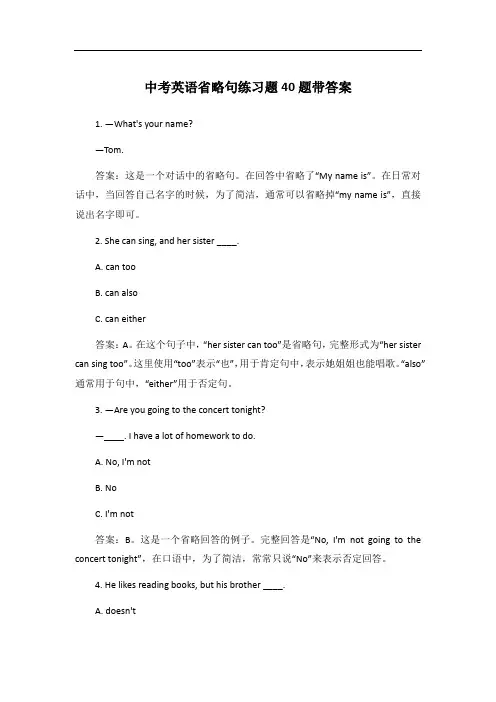
中考英语省略句练习题40题带答案1. —What's your name?—Tom.答案:这是一个对话中的省略句。
在回答中省略了“My name is”。
在日常对话中,当回答自己名字的时候,为了简洁,通常可以省略掉“my name is”,直接说出名字即可。
2. She can sing, and her sister ____.A. can tooB. can alsoC. can either答案:A。
在这个句子中,“her sister can too”是省略句,完整形式为“her sister can sing too”。
这里使用“too”表示“也”,用于肯定句中,表示她姐姐也能唱歌。
“also”通常用于句中,“either”用于否定句。
3. —Are you going to the concert tonight?—____. I have a lot of homework to do.A. No, I'm notB. NoC. I'm not答案:B。
这是一个省略回答的例子。
完整回答是“No, I'm not going to the concert tonight”,在口语中,为了简洁,常常只说“No”来表示否定回答。
4. He likes reading books, but his brother ____.A. doesn'tB. don'tC. isn't答案:A。
这里“his brother doesn't”是省略句,完整的是“his brother doesn't like reading books”。
句子前半部分是一般现在时,主语“his brother”是第三人称单数,所以助动词用“does”,否定形式为“doesn't”。
5. —Does he like football?—Yes, he ____.A. likeB. doesC. likes答案:B。
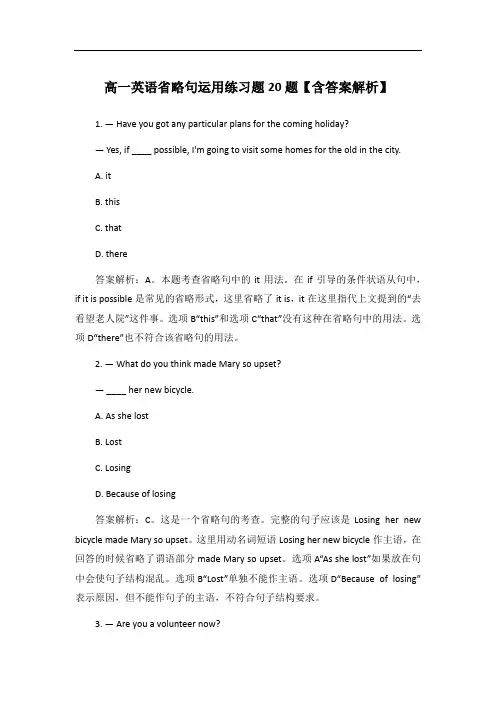
高一英语省略句运用练习题20题【含答案解析】1. — Have you got any particular plans for the coming holiday?— Yes, if ____ possible, I'm going to visit some homes for the old in the city.A. itB. thisC. thatD. there答案解析:A。
本题考查省略句中的it用法。
在if引导的条件状语从句中,if it is possible是常见的省略形式,这里省略了it is,it在这里指代上文提到的“去看望老人院”这件事。
选项B“this”和选项C“that”没有这种在省略句中的用法。
选项D“there”也不符合该省略句的用法。
2. — What do you think made Mary so upset?— ____ her new bicycle.A. As she lostB. LostC. LosingD. Because of losing答案解析:C。
这是一个省略句的考查。
完整的句子应该是Losing her new bicycle made Mary so upset。
这里用动名词短语Losing her new bicycle作主语,在回答的时候省略了谓语部分made Mary so upset。
选项A“As she lost”如果放在句中会使句子结构混乱。
选项B“Lost”单独不能作主语。
选项D“Because of losing”表示原因,但不能作句子的主语,不符合句子结构要求。
3. — Are you a volunteer now?— No, but I ____. I worked for the City Sports Meeting last year.A. used to beB. used toC. used to doD. was used to答案解析:A。
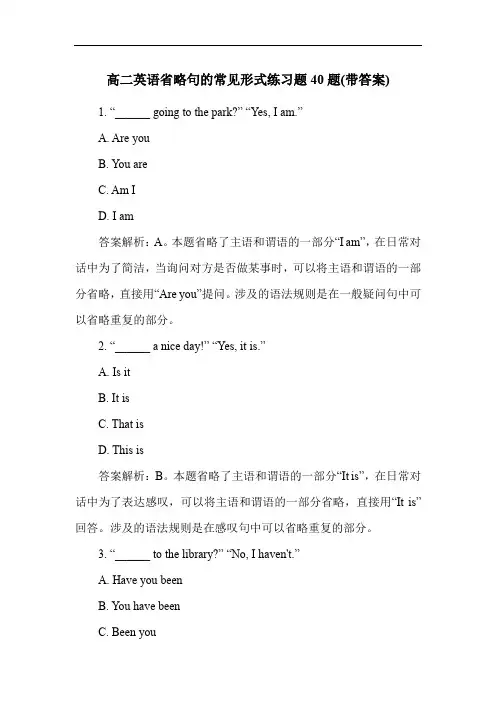
高二英语省略句的常见形式练习题40题(带答案)1. “______ going to the park?” “Yes, I am.”A. Are youB. You areC. Am ID. I am答案解析:A。
本题省略了主语和谓语的一部分“I am”,在日常对话中为了简洁,当询问对方是否做某事时,可以将主语和谓语的一部分省略,直接用“Are you”提问。
涉及的语法规则是在一般疑问句中可以省略重复的部分。
2. “______ a nice day!” “Yes, it is.”A. Is itB. It isC. That isD. This is答案解析:B。
本题省略了主语和谓语的一部分“It is”,在日常对话中为了表达感叹,可以将主语和谓语的一部分省略,直接用“It is”回答。
涉及的语法规则是在感叹句中可以省略重复的部分。
3. “______ to the library?” “No, I haven't.”A. Have you beenB. You have beenC. Been youD. Are you答案解析:A。
本题省略了主语和谓语的一部分“I have been”,在一般疑问句中为了简洁,可以将主语和谓语的一部分省略,直接用“Have you been”提问。
涉及的语法规则是在一般疑问句中可以省略重复的部分。
4. “______ a book on the table.” “Yes, there is.”A. Is thereB. There isC. That isD. This is答案解析:B。
本题省略了主语和谓语的一部分“There is”,在肯定回答中为了简洁,可以将主语和谓语的一部分省略,直接用“There is”回答。
涉及的语法规则是在肯定回答中可以省略重复的部分。
5. “______ your homework?” “Yes, I did.”A. Did you doB. You didC. Do youD. Are you答案解析:A。
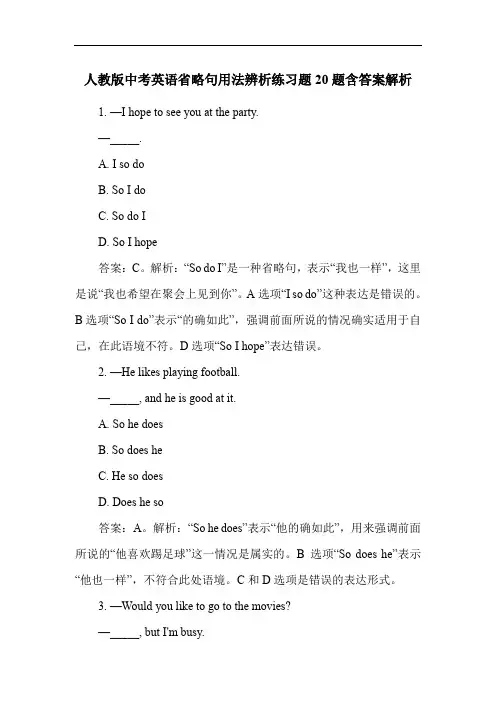
人教版中考英语省略句用法辨析练习题20题含答案解析1. —I hope to see you at the party.—_____.A. I so doB. So I doC. So do ID. So I hope答案:C。
解析:“So do I”是一种省略句,表示“我也一样”,这里是说“我也希望在聚会上见到你”。
A选项“I so do”这种表达是错误的。
B选项“So I do”表示“的确如此”,强调前面所说的情况确实适用于自己,在此语境不符。
D选项“So I hope”表达错误。
2. —He likes playing football.—_____, and he is good at it.A. So he doesB. So does heC. He so doesD. Does he so答案:A。
解析:“So he does”表示“他的确如此”,用来强调前面所说的“他喜欢踢足球”这一情况是属实的。
B选项“So does he”表示“他也一样”,不符合此处语境。
C和D选项是错误的表达形式。
3. —Would you like to go to the movies?—_____, but I'm busy.A. I'd love toB. I loveC. I willD. I like答案:A。
解析:“I'd love to”是“I would love to”的省略形式,用于回答“Would you like...”的问句,表示“我很想去”。
B选项“I love”缺少宾语且这种回答不符合习惯。
C选项“I will”不能用于回答这个问句。
D选项“I like”同样不符合回答这种问句的习惯。
4. —Are you a student?—_____. I'm a teacher.A. No, I'm notB. Yes, I'm notC. No, I amD. Yes, I am答案:A。
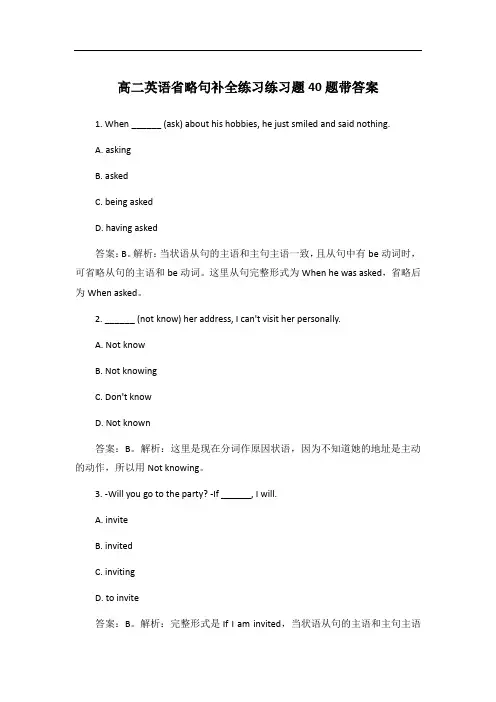
高二英语省略句补全练习练习题40题带答案 1. When ______ (ask) about his hobbies, he just smiled and said nothing. A. asking B. asked C. being asked D. having asked 答案:B。解析:当状语从句的主语和主句主语一致,且从句中有be动词时,可省略从句的主语和be动词。这里从句完整形式为When he was asked,省略后为When asked。
2. ______ (not know) her address, I can't visit her personally. A. Not know B. Not knowing C. Don't know D. Not known 答案:B。解析:这里是现在分词作原因状语,因为不知道她的地址是主动的动作,所以用Not knowing。
3. -Will you go to the party? -If ______, I will. A. invite B. invited C. inviting D. to invite 答案:B。解析:完整形式是If I am invited,当状语从句的主语和主句主语 一致,从句中有be动词时,可省略主语和be动词。 4. The man, ______ (look) tired and sleepy, didn't answer my question. A. looking B. looked C. being looked D. to look 答案:A。解析:这里是现在分词作伴随状语,这个男人看起来疲惫困倦,表示主动的状态,所以用looking。
5. He opened his mouth as if ______ (say) something. A. say B. to say C. saying D. said 答案:B。解析:as if后可接不定式表示目的或将来的动作,这里表示好像要说些什么。
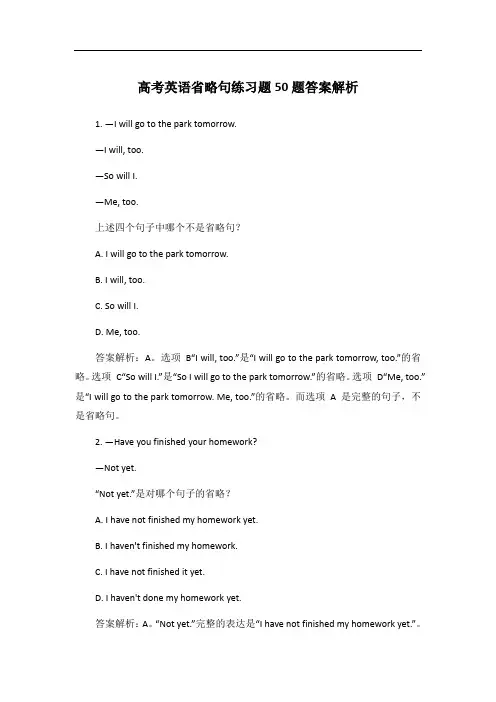
高考英语省略句练习题50题答案解析1. —I will go to the park tomorrow.—I will, too.—So will I.—Me, too.上述四个句子中哪个不是省略句?A. I will go to the park tomorrow.B. I will, too.C. So will I.D. Me, too.答案解析:A。
选项B“I will, too.”是“I will go to the park tomorrow, too.”的省略。
选项C“So will I.”是“So I will go to the park tomorrow.”的省略。
选项D“Me, too.”是“I will go to the park tomorrow. Me, too.”的省略。
而选项 A 是完整的句子,不是省略句。
2. —Have you finished your homework?—Not yet.“Not yet.”是对哪个句子的省略?A. I have not finished my homework yet.B. I haven't finished my homework.C. I have not finished it yet.D. I haven't done my homework yet.答案解析:A。
“Not yet.”完整的表达是“I have not finished my homework yet.”。
选项B 缺少“yet”。
选项 C 中的“it”指代不明。
选项D“done my homework”与问句中的“finished your homework”不对应。
3. —Let's go shopping.—Good idea.“Good idea.”是对哪个句子的省略?A. That's a good idea.B. It's a good idea.C. This is a good idea.D. I think it's a good idea.答案解析:A。
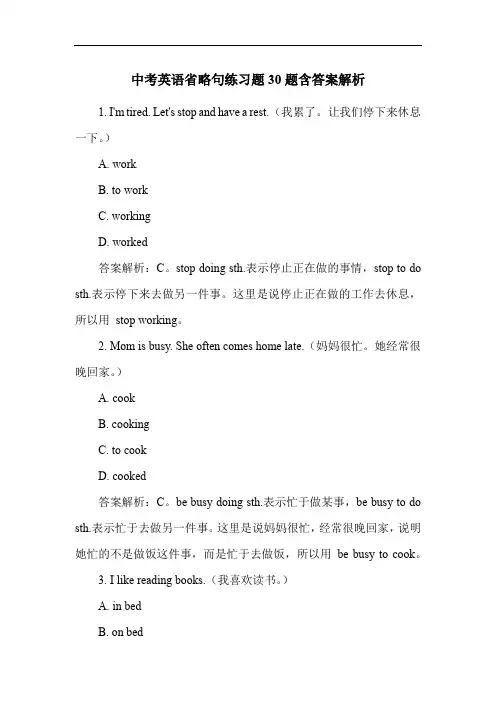
中考英语省略句练习题30题含答案解析1. I'm tired. Let's stop and have a rest.(我累了。
让我们停下来休息一下。
)A. workB. to workC. workingD. worked答案解析:C。
stop doing sth.表示停止正在做的事情,stop to do sth.表示停下来去做另一件事。
这里是说停止正在做的工作去休息,所以用stop working。
2. Mom is busy. She often comes home late.(妈妈很忙。
她经常很晚回家。
)A. cookB. cookingC. to cookD. cooked答案解析:C。
be busy doing sth.表示忙于做某事,be busy to do sth.表示忙于去做另一件事。
这里是说妈妈很忙,经常很晚回家,说明她忙的不是做饭这件事,而是忙于去做饭,所以用be busy to cook。
3. I like reading books.(我喜欢读书。
)A. in bedB. on bedC. in the bedD. on the bed答案解析:A。
in bed 表示躺在床上、卧病在床;in the bed 表示在床里面;on the bed 表示在床上面。
这里是说喜欢在床上读书,不是指在床里面或上面,所以用in bed。
4. Dad is watching TV.(爸爸在看电视。
)A. in the living roomB. on the living roomC. at the living roomD. to the living room答案解析:A。
in the living room 表示在客厅里;on the living room 没有这种用法;at the living room 也不太准确;to the living room 表示去客厅。
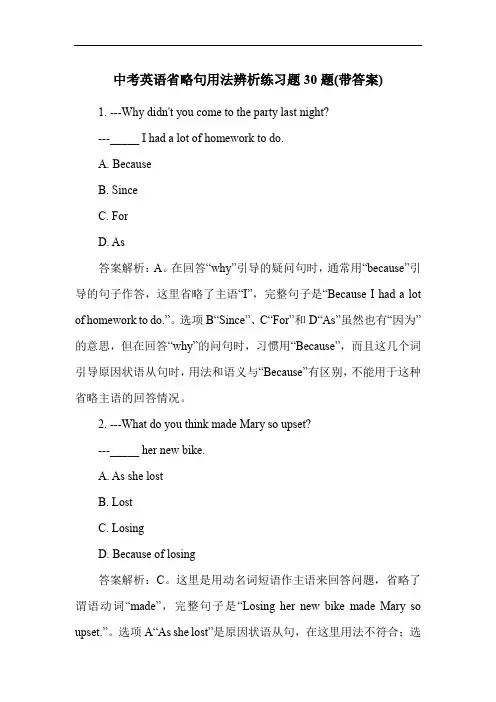
中考英语省略句用法辨析练习题30题(带答案)1. ---Why didn't you come to the party last night?---_____ I had a lot of homework to do.A. BecauseB. SinceC. ForD. As答案解析:A。
在回答“why”引导的疑问句时,通常用“because”引导的句子作答,这里省略了主语“I”,完整句子是“Because I had a lot of homework to do.”。
选项B“Since”、C“For”和D“As”虽然也有“因为”的意思,但在回答“why”的问句时,习惯用“Because”,而且这几个词引导原因状语从句时,用法和语义与“Because”有区别,不能用于这种省略主语的回答情况。
2. ---What do you think made Mary so upset?---_____ her new bike.A. As she lostB. LostC. LosingD. Because of losing答案解析:C。
这里是用动名词短语作主语来回答问题,省略了谓语动词“made”,完整句子是“Losing her new bike made Mary so upset.”。
选项A“As she lost”是原因状语从句,在这里用法不符合;选项B“Lost”不能单独作主语;选项D“Because of losing”表示原因,但不能作句子的主语,用法错误。
3. ---I'm going to the supermarket.---_____ some milk for me, will you?A. BuyB. To buyC. BuyingD. Bought答案解析:A。
这里是祈使句的省略形式,省略了主语“you”,完整句子是“You buy some milk for me, will you?”。
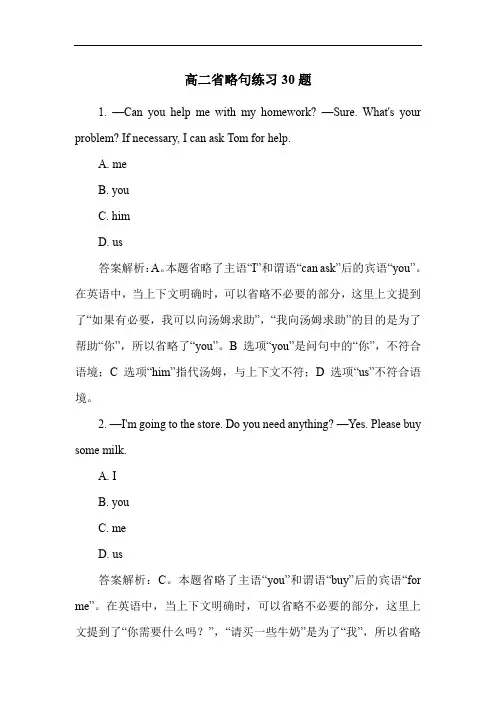
高二省略句练习30题1. —Can you help me with my homework? —Sure. What's your problem? If necessary, I can ask Tom for help.A. meB. youC. himD. us答案解析:A。
本题省略了主语“I”和谓语“can ask”后的宾语“you”。
在英语中,当上下文明确时,可以省略不必要的部分,这里上文提到了“如果有必要,我可以向汤姆求助”,“我向汤姆求助”的目的是为了帮助“你”,所以省略了“you”。
B 选项“you”是问句中的“你”,不符合语境;C 选项“him”指代汤姆,与上下文不符;D 选项“us”不符合语境。
2. —I'm going to the store. Do you need anything? —Yes. Please buy some milk.A. IB. youC. meD. us答案解析:C。
本题省略了主语“you”和谓语“buy”后的宾语“for me”。
在英语中,当上下文明确时,可以省略不必要的部分,这里上文提到了“你需要什么吗?”,“请买一些牛奶”是为了“我”,所以省略了“for me”。
A 选项“I”不符合语境;B 选项“you”是问句中的“你”,不符合语境;D 选项“us”不符合语境。
3. —Have you seen my book? —No. I haven't seen it.A. youB. yourC. yoursD. you're答案解析:C。
本题省略了主语“I”和谓语“haven't seen”后的宾语“your book”。
在英语中,当上下文明确时,可以省略不必要的部分,这里上文提到了“你看到我的书了吗?”,“我没看到它”中的“它”指代“你的书”,所以省略了“your book”。
A 选项“you”是“你”,不符合语境;B 选项“your”是“你的”,后面需要接名词;D 选项“you're”是“you are”的缩写,不符合语境。
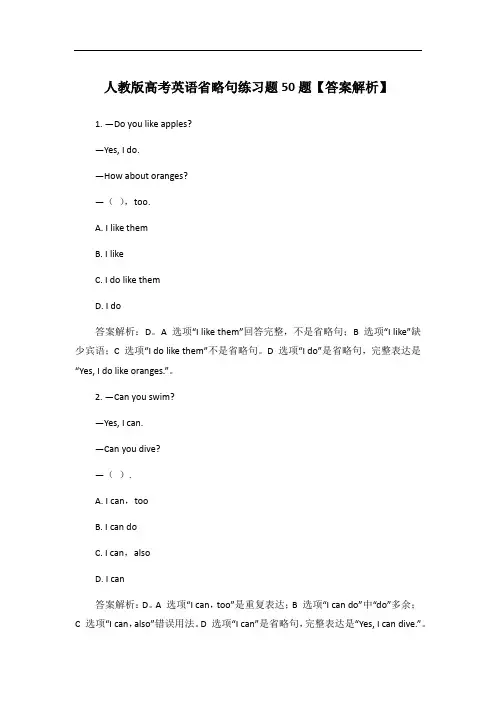
人教版高考英语省略句练习题50题【答案解析】1. —Do you like apples?—Yes, I do.—How about oranges?—(),too.A. I like themB. I likeC. I do like themD. I do答案解析:D。
A 选项“I like them”回答完整,不是省略句;B 选项“I like”缺少宾语;C 选项“I do like them”不是省略句。
D 选项“I do”是省略句,完整表达是“Yes, I do like oranges.”。
2. —Can you swim?—Yes, I can.—Can you dive?—().A. I can,tooB. I can doC. I can,alsoD. I can答案解析:D。
A 选项“I can,too”是重复表达;B 选项“I can do”中“do”多余;C 选项“I can,also”错误用法。
D 选项“I can”是省略句,完整表达是“Yes, I can dive.”。
3. —Are you hungry?—Yes, I am.—Do you want something to eat?—().A. I am hungryB. I wantC. Yes,I doD. Yes,please答案解析:D。
A 选项“I am hungry”不是省略句,且与问题不直接对应;B 选项“I want”缺少宾语;C 选项“Yes,I do”是对“Do you...?”的回答,不符合此处语境。
D 选项“Yes,please”是省略句,完整表达是“Yes, I want something to eat. Please give me something to eat.”。
4. —Did you see the movie?—Yes, I did.—Was it good?—().A. It was goodB. Yes,it wasC. It wasD. Yes答案解析:B。
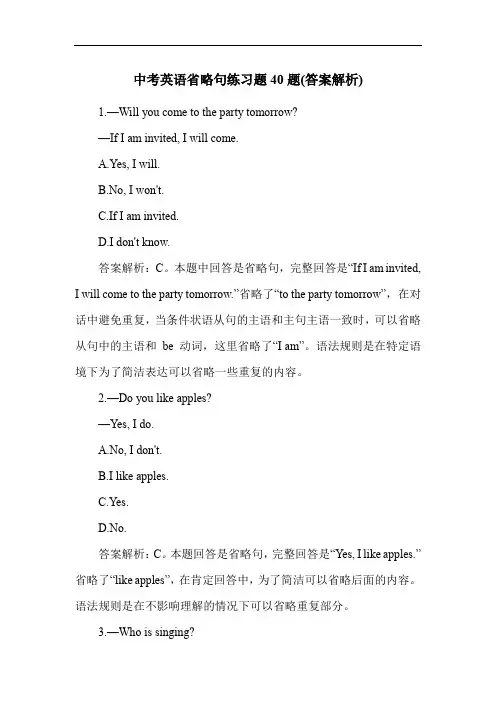
中考英语省略句练习题40题(答案解析)1.—Will you come to the party tomorrow?—If I am invited, I will come.A.Yes, I will.B.No, I won't.C.If I am invited.D.I don't know.答案解析:C。
本题中回答是省略句,完整回答是“If I am invited, I will come to the party tomorrow.”省略了“to the party tomorrow”,在对话中避免重复,当条件状语从句的主语和主句主语一致时,可以省略从句中的主语和be 动词,这里省略了“I am”。
语法规则是在特定语境下为了简洁表达可以省略一些重复的内容。
2.—Do you like apples?—Yes, I do.A.No, I don't.B.I like apples.C.Yes.D.No.答案解析:C。
本题回答是省略句,完整回答是“Yes, I like apples.”省略了“like apples”,在肯定回答中,为了简洁可以省略后面的内容。
语法规则是在不影响理解的情况下可以省略重复部分。
3.—Who is singing?—Mary is.A.John is.B.Lucy is.C.Mary is singing.D.I don't know.答案解析:C。
本题回答是省略句,完整回答是“Mary is singing.”省略了“singing”,在回答问题时,可以省略与问题重复的部分。
语法规则是为了简洁表达可以省略已知信息。
4.—Where are you going?—To the park.A.To school.B.To the zoo.C.To the park.D.I don't know.答案解析:C。
本题回答是省略句,完整回答是“I am going to the park.”省略了“I am going”,在回答地点的问题时,可以省略前面的动词和主语。
中考英语省略句练习题40题(答案解析)1. —I like reading books. —____.A. So do IB. So I doC. So am ID. So I am答案解析:A。
这题考查的是“so + 助动词/系动词/情态动词+主语”这一省略结构,表示“某人也一样”。
原句中like是实义动词,所以要用助动词do。
B选项“So I do”表示“的确如此”,强调前面说的情况属实,不符合题意。
C选项中am与原句的like不匹配。
D选项同理。
2. She can sing, and her sister ____.A. can tooB. can alsoC. also canD. too can答案解析:A。
在并列句中,后一句为了避免重复,常采用省略形式。
这里完整形式是her sister can sing too,在省略动词sing后,就变成her sister can too。
B选项also一般放在句中。
C和D选项语序错误。
3. —Will you go to the park tomorrow? —I'm not sure. I might ____.A. goB. to goC. goingD. goes答案解析:A。
这是一个省略句,完整形式是I might go to the park tomorrow,为了避免重复,省略了to the park tomorrow部分。
B选项to go形式错误,情态动词后接动词原形。
C选项going形式错误。
D 选项goes是第三人称单数形式,不符合此处要求。
4. He didn't come to the party, but he ____.A. shouldB. should haveC. should beD. should had答案解析:B。
这里考查的是“should + have+过去分词”的省略形式,表示“本应该做某事而没做”。
省略句练习与答案 自我检测 1. -What’s the matter with John? -He didn’t pass the test but he still____. A. hopes so B. hopes to C. hopes it D. hopes that 2. -She must look like a very pretty girl. - Yes, I imagine__________. A. to B. that C. it D. so 3. This is an illness that can result in total blindness__________ left untreated. A. after B. if C. since D. unless 4. -What will John Smith be doing in the fall of this year? -_________ mathematics at a high school. A. Teaching B. To teach C. Be teaching D. Teac 5. -Better not have the operation right now. -________. A. I mustn’t B. I shouldn’t C. I won’t D. I can’t 6. -Will you go to the party? -Of course I will if_________. A. I was invited B. invited C. having invited D. I will be invited 7. The special medicine for the disease was difficult to find though________ everywhere. A. sought B. having sought C. being sought D. having been sought 8. Taking such kind of medicine, if _______ , will possibly do you great harm. A. continue B. to continue C. continued D. continuing 9. He is not easy to get along with, but the friendship of his, _________, will last forever. A. once gained B. to be gained C. after gained D. while gaining 10. -Don’t forget to take the message to my teacher. -_________. A. Yes, I will B. No, I won’t C. I don’t think so D. Sorry, I don’t 11. The road is designed for only motor vehicles, so once________, bicycles are not allowed to go along it.
A. opens B. having opened C. opening D. opened 12. The teacher told us not to take the equipment out of the laboratory until_________. A. allowing to take B. allowing to C. allowed to be taken D. allowed to 13. -Will you go home tomorrow evening? -No, I am going to a lecture, or at least, I’m planning________. A. so B. to C. it D. that 14. Would you read my letter and correct the mistakes if________? A. some B. ever C. any D. never 15. When________ where he was born, the old man was afraid to give his address. A. asking B. asked C. was asked D. ask 16. Don’t speak to anyone when you are in a strange situation unless________. A. you will be spoken B. you speak to C. spoken to D. you spoken to 17. -Will the Smiths be going abroad this summer? -No, they finally decided_________. A. not to be B. not to do C. not going D. not to 18. -How do you think Mary managed to improve her French in such a short time? -_________ 4 hours on it every morning. A. Because of spending B. By spending C. Spent D. To spend 19. “If”, he added at the meeting, “________ enough time, we would certainly have done it better.” A. given B. to be given C. give D. giving 20. If you talk to these senior students, you will find that they have much greater knowledge than commonly_________.
A. supposing B. supposed C. to suppose D. suppose
一、高考链接 1. — You haven't lost the ticket, have you? — _________. I know it's not easy to get another one at the moment.(2004江苏) A. I hope not B. Yes, I have C. I hope so D. Yes, I’m afraid so 【解析】A. 用so,not或其它手段来省略上文或问句中的一部分或整个句义,是高考的常考项目。本题就是考查这一考点,根据句意,选A。
译文:—你的票没有丢掉,是吗? —我希望没有,我知道此刻要再搞到一张是不容易的。 2. When help, one often says “ Thank you.” or “It’s kind of you.”(2005福建) A. offering B. to offer C. to be offered D. offered 【解析】D. 本题是高考中常考的又一考点,在when,while,if,as if,though(或although),as,until,once,whether,unless,where等连词连接的状语从句中,常省略跟主句相同的主语和be动词。本题省去了“one is”。
译文:一个人在接受到帮助的时候,经常会说“谢谢”或“你真好”。 3. — How about putting some pictures into the report? —___ A picture is worth a thousand words.(2005江苏) A. No way. B. Why not? C. All right? D. No matter. 【解析】B. “why (not) do” 结构中, 不定式不带to,属于一种句型化的省略。 译文:—将报告中加几张图片怎么样? —为什么不呢?一画顶千言。 4. — I was wondering if we could go skiing on the weekend. — _______good. (2006湖北) A. Sound B. Sounded C. Sounding D. Sounds 【解析】D. “It/That sounds good/great/….”这样的答语中常省略主语。 译文:—我在想是否可以周末去滑雪? —听起来很好。 5. —How about seeing the new movie at the theatre tonight? — ______, but I've got to go over my notes for tomorrow's exam. (2006重庆) A. All right B. Sounds great C. I can’t D. No, I am terribly sorry 【解析】B.本题同上题。 译文:—今晚到戏院看新上映的电影怎么样? —听起来好极了,可是我得复习准备明天的考试。 6. — Do you mind my smoking here? — ______. (2006四川) A. No, thanks B. No, Good idea C. Yes, please D. Yes. Better not 【解析】D. “Better not.”是“You'd better not.”的省略。 译文:—你介意我在这里抽烟吗? —是的,最好不要。 7. In my opinion, life in the twenty-first century is much easier than ______.(2007安徽) A. that used to be B. it is used to C. it was used to D. it used to be 【解析】D. 本题考查的是比较状语从句中的省略,在比较状语从句中,as/than后面常使用省略。 译文:根据我的想法,二十一世纪的生活比过去舒适多了。 8. —It’s a long time since I saw my sister.